|
SIMON WOOLF's RECITAL RECORDINGS

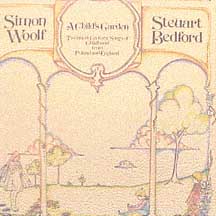 A Child's Garden A Child's Garden
(Unicorn RHS 316, LP) 1969 n.l.a.
41 Twentieth Century Songs of Childhood From Poland and England
(Click on the links to sample sound tracks
and for texts and photos)
Contact for enquiries
KAROL SZYMANOWSKI Twenty Children's Rhymes (sung in Polish)*
Przed Zasnieciem (Before falling asleep); Jak si, najlepiej op,dzac ad szerszenia How to best get away from a hornet; Mieszkanie-Home; Prosi - (Piglet); Gwiazdka - Christmas
Slub krolewny - (The Princess' wedding)
Trzmiel i iuk - The bumblebee and the beetle; Swieta Krystyna - Saint Krystyna; Wiosna - Spring; Kolysanka Lalek - The dolls' lullaby ; Gil i sroka - The bullfinch and the magpie; Smutek - The sad one; Wizyta u krowy - A visit at the cow's ; Kolysanka Krzysi - Krzysia's lullaby ; Kot - The cat; Kolysanka Lalki - Lalka's lullaby ; Myszy - Mice; Zly Lejba - The cheating shopkeeper ; Kolysanka gniadego konia The bay-horse's lullaby; Nikczemny szpak - The ill-tempered starling
ENGLISH SONGS
The Ship of Rio (Britten)
Poor Henry (Berkeley)
The Fly (Bennett)
Clock-a Clay (Bennett)
I had a dove (Frankel)
The Wind at Morning (Salzedo)
Fishing:The Herd-Boy's Song (Oldham)
From a Child's Garden
(R.L Stevenson cycle of of 12 poems set by Sir Malcolm Williamson)
My Bed is a Boat (No 8)
Where the bee sucks (Tippett)
*Full texts and translations of the Illakowicza poems set by Szymanowski
SZYMANOWSKI
TWENTY CHILDREN'S RHYMES OP. 49
Brief yet striking miniatures abound in this recital of songs of childhood. Illakowiczowna's verses inspired Szymanowski towards a new concentration and transparency of style, and the attractive, spontaneous Children's Rhymes will surprise and delight those who may find his larger works, with their rich textures and intense emotionalism, somewhat cloying. The poems are about the nursery, animal life and nature, themes similar to those of the English songs in this recital. Here it is as if an imaginative child is making up the poems, sharing the thoughts and fantasies with a doll, and projecting fears and secrets upon animal characters.
Szymanowski's sister, Stanislawa, wrote that interpreters "should forget their own ambitions as singers and the technical routine of correct voice production, even though there are certain vocal difficulties such as sustained pianissimos. One has to want to be in the nursery, to feel its presence, and become a child again". Perhaps, as in the case of Mussorgsky's The Nursery) one right solution is for the songs to be interpreted in a child's own voice, so as to recapture the freshness and immediacy of Szymanowski's original vision.
Generous Polish friends helped Simon to perfect his performance until Dr. T. Krzeszowski of Edinburgh University Linguistics Department was able to testify that "the enunciation is such that the words can be followed and understood without any effort on the part of the Polish-speaking listener. The recording is free not only of mistakes in pronunciation but even of minor slips".
Szymanowski's biographer, B. M. Maciejewski, considers these songs by Poland's greatest composer of the early 20th Century to be "in the very best Mussorgsky tradition". He welcomed this first recording of the Children's Rhymes writing, "Simon Woolf understands the romantic simplicity of Szymanowski's vocal writing and he brings out the composer's subtle sense of humour. His interpretation is very convincing, indeed inspired. The singing in the original Polish has no trace of any foreign inflection-a truly remarkable achievement".
ENGLISH SONGS
In his early years Simon's staple musical diet comprised piano pieces from Bartok's Mikrokosmos and songs by Britten, the later sets purchased immediately each was published. Children can respond eagerly to vocal music by many of those contemporary composers whose instrumental works rarely cater for young musicians and small hands. So the English songs chosen for this recital "illustrate how one boy got to know important living composers of his own country. Maybe listeners to these performances will share the excitement of exploration and discovery.
Simon was privileged to meet most of the composers, whose songs deal with different aspects of childhood. The life of the nursery is evoked by Britten and Berkeley in settings of Walter de la Mare, and by Williamson in his recent cycle to favourite Robert Louis Stevenson verses. Nature and the countryside are the subjects of the group by Salzedo and Oldham. Animal life, interpreted by various poets, links the songs by Britten, Bennett, Frankel and Tippett.
Benjamin Britten's early school-song, The Ship of Rio, needs no comment save to reveal that an extra pianist was needed to complete our recording of the composer's revised version. One very high note on the Steinway obstinately refused to sound, so Grayston Burgess supplied it on the Bishopsgate Hall's other piano. Thus Britten's part-song, originally for two voices and piano, re-appears as a solo with accompaniment for two pianos! The poet of childhood, Walter de la Mare, is one link between our first two English songs; another is the close association between their composers, who even collaborated once on a joint composition, MontJuic. Simon's account of Poor Henry gave Lennox Berkeley great pleasure. "It's surely very suitable that a boy should sing it", he wrote, "and I was much struck by his undoubted interpretative gift." Simon's operatic experience stood him in good stead for this harrowing tale of a boy swallowing horrid medicine.
Richard Rodney Bennett's The Insect World for unison voices, dedicated to Malcolm and Dolly Williamson, brings us back to the world of the school choir (Clock-a-clay is an old name for the ladybird). Benjamin Frankel's strangely haunting I had a dove has long been a favourite of ours, and his Eight Songs all deserve to be better known. Simon was privileged to sing them to the composer's own piano accompaniment. Perhaps a boy's voice can help to realise the childlike simplicity and directness of Keats' poem and Frankel's direction "con un innocenza grottesca".
Leonard Salzedo composed The Wind at Morning after hearing Simon sing Stravinsky's last published composition, his 12-note setting of The Owl and the Pussy Cat. Salzedo's friend John Cromer supplied a nature poem and the song was deliberately made "not very easy to sing"! Arthur Oldham's Chinese Lyrics also evoke nature anathe countryside. They have been in Simon's repertoire since he was 8, when he corresponded with the composer about a technical point of interpretation.
Malcolm Williamson has high regard for R. L. Stevenson's popular and deceptively simple children's poems. He stresses their dark undertones and has composed songs, some tuneful and romantic, others terse epigrams which rival Web ern in achieving complete and memorable statements within a quarter of a minute! The composer himself made a domestic recording of From a Child's Garden with Simon very soon after it was published, and he praised his singing as "entirely characteristic for what these Stevenson words require".
Sir Michael Tippett's tiny song is an ideal encore, unique in its precision and economy for a time when the composer still favoured a luxuriant proliferation of counterpoint. The alternative harpsichord version of Songs of Arid was performed first by Grayston Burgess, Simon's singing teacher. The composer was happy that Simon should sing them, a boy's timbre being obviously apt for Shakespeare's sprite.
© P. Grahame Woolf
Simon Woolf was born in August 1954 into a musical family. He sang from early childhood I and learnt to play recorders, piano and cello. Only after a Royal Festival Hall appearance with Joan Sutherland and a successful BBC audition the following day did he take singing lessons, with Grayston Burgess, the director of the Purcell Consort of Voices. These studies enabled Simon to develop an unique repertoire of songs about childhood, never previously sung by children. Throughout two packed years until his voice broke he was in constant demand for the concert platform and operatic stage, radio and television, whilst continuing his general education at St. Dunstan's College, London.
Simon Woolf's recordings include medieval motets, Purcell and Handel, Mendelssohn's Elijah and recent songs by living composers. No other boy singer has ever recorded music of such variety. "Records and Recording"
has written of Simon Woolf; "This is a boy artist of exceptional maturity".
Steuart Bedford was at the time of recording a member of the music staff of The English Opera Group and a professor at the Royal Academy of Music. Well known as a conductor, organ recitalist and pianist, he was Simon Woolf's partner for his first recital record of songs by Russian composers.
Recorded at Bishopsgate Hall, London in February and March 1969
Musical Director: Grayston Burgess; Engineer: ]. W. Bower
Polish Language: J. Kot and R. Pachocinski
Programme devised and produced by P. Grahame Woolf
Sleeve design and Illustration: Hamish Grimes
Translations: S. A. Witkowski and J. Abramczuk *
Session photographs: Peter W. Goff
Children's Songs by Russian Composers
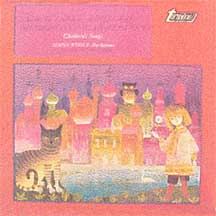
Mussorgsky
- The Nursery: With Nurse; In the Corner; The Beetle; Dolly's Lullaby; Evening Prayer; The cat and the birdcage; The hobby-horse
- A Child's Song; Ragamuffin
Prokofiev
- Three Children's Songs: Chatterbox; Lollipop; The Little Pigs
- The Ugly Duckling
Stravinsky The Owl and the Pussycat [Accompanied by Peter Grahame Woolf]
Kabelevsky
- Seven Nursery Rhymes: Old King Cole; If all the seas were one sea;- I saw a ship a-sailing; There was an old woman; For want of a nail the horse-shoe was lost; Five little pigs; The Key of the Kingdom
Simon Woolf (boy soprano) Steuart Bedford (piano), Dr P Grahame Woolf (piano). Turnabout TV 34331S 1968 n.l.a.
REVIEWS of the Turnabout LP:
THIS IS VERY MUCH a family affair, for not only does the 13-year-old boy soprano Simon Woolf sing this recital, but Dr P Grahame Woolf, his father, appears as pianist (in the Stravinsky) and either translator or reviser of the translation in all cases (except the Stravinsky, a seldom heard setting of Edward Lear in serial technique, would you believe); Dr Woolf also contributes the sleeve-notes.
This collection of Russian children's songs makes a most attractive programme, covering quite a wide range of compositional styles, and Simon Woolf's performances have extraordinary interpretative maturity. In the fine Mussorgsky song-cycle The Nursery (surely the most remarkable example of a composer's insight into the feelings of childhood) he brings the various characters (adult as well as childish) vividly to life, and sings throughout the disc with exceptional feeling for atmosphere and the meaning of the words, as well as real musical sensitivity. Steuart Bedford's accompaniments are superbly pointed and coloured, and the delightfully tongue-in-cheek Stravinsky is beautifully done by Dr Woolf - - altogether a most auspicious record. JOHN MCCABE (Records & Recording July 1971)
Click to see other reviews
The Boy Choir & Soloist Directory
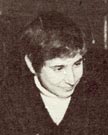 Simon Woolf Simon Woolf
From a local debut in "Acis and Galatea" near his Blackheath home, twelve-year-old Simon Woolf was catapulted into London's musical life at the highest professional level.
His second concert found him singing solos in Messiah at the Royal Festival Hall alongside Joan Sutherland. After that Simon Woolfwhas been in continual demand for the concert platform, operatic stage, radio and television until his voice broke.
His operatic roles included Amah! and two seasons in The Magic Flute at the Royal Opera House, Covent Garden. His gramophone recordings include duets with Fischer-Dieskau (Elijah) and John Shirley-Quirk (Hail Bright Cecilia).
After a star-studded childhood career as a treble, Simon Woolf went to an opposite pole of the musical world, becoming a jazz bassist.
He has performed regularly with many top London players, notably as part of Andy Panayi's Mulligan-infIuenced quartet, as well as backing visiting Americans. He has a distinguished freelance career which includes stints with Bobby Wellins, Bill le Sage, Dave Cliff, John Critchinson, cornettist Ruby Braff and singer Weslia Whitfield.
As well as working with Andy Panayi's Quartet, he has also been a regular member of bands led by pianist Peter Jacobsen and Geoff Simkins. Recordings include a trio with Harry Allen and Howard Alden and an appearance on a Steve Melling release. He also composes, plays piano and sousaphone, has taught jazz bass at both Trinity and Royal Colleges of Music and contributed to 'Doublebassist' magazine.
Listen to don't ask
- Geoff Simkins Quartet
(Symbol Records)
|
|
Playing jazz piano, and bass with Dave Cliff, at Pizza Express 1994 & 2002
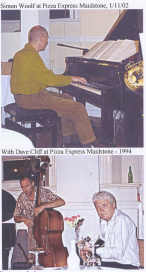
|
Other Recordings:
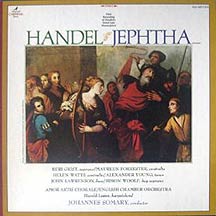
Handel: Jephtha (Vanguard Cardinal Stereo VCS 10077/8/9, 3 LPs)
Reri Grist / Mareen Forrester / Helen Watts /
Alexander Young / Simon Woolf
with the English Chamber Orch.
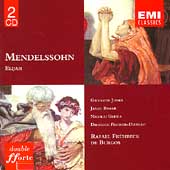
Mendelssohn: Elijah
(EMI CDFB 68601, 2CD)
with Fischer-Dieskay, Nicolia Gedda, Janet Baker,
Simon Woolf, Wandsworth School Boys' Chorus,
Philharmonia Chorus & Orchestra cond. Rafael Frubeck de Burgos
|
Purcell: Ode on St. Cecilia's Day (1692)
Hail Bright Cecilia
(Archiv Galleria 427 159) 1969
with Alexander Young, John Shirley-Quirk, Simon Woolf, Tiffin School Boys Chorus, Ambrosian Singers, English Chamber Orchestra
conducted by Charles MacKerras
|

SIMON WOOLF'S "WOOLF NOTES"
- - One of the country's leading Jazz bass players, his melodic invention and remarkable technique mark him out as one of the most musical and tasteful players on the scene. His band reflects his own interest in melodic, straight-ahead, Jazz, the repertoire consisting of Simon's originals plus a variety of classic Jazz standards, all arranged by Simon, and performed by some of the finest players around.
Steve Rubie, owner 606club
|
|



